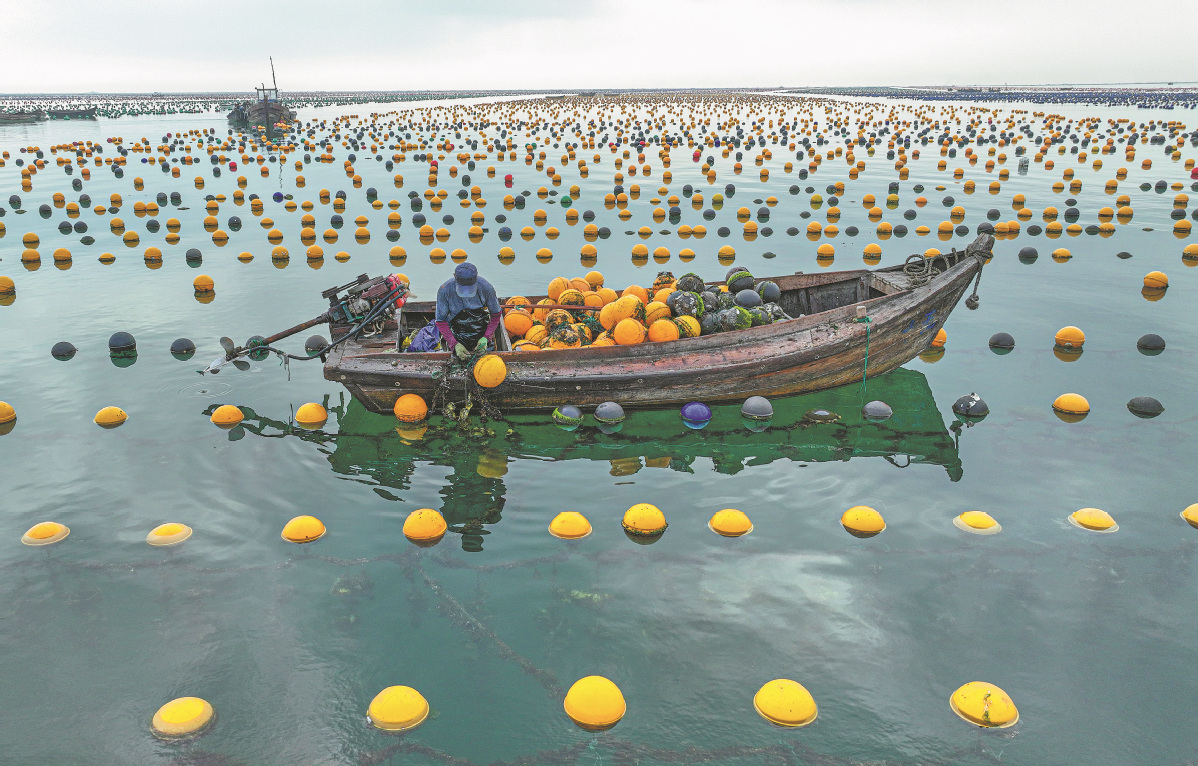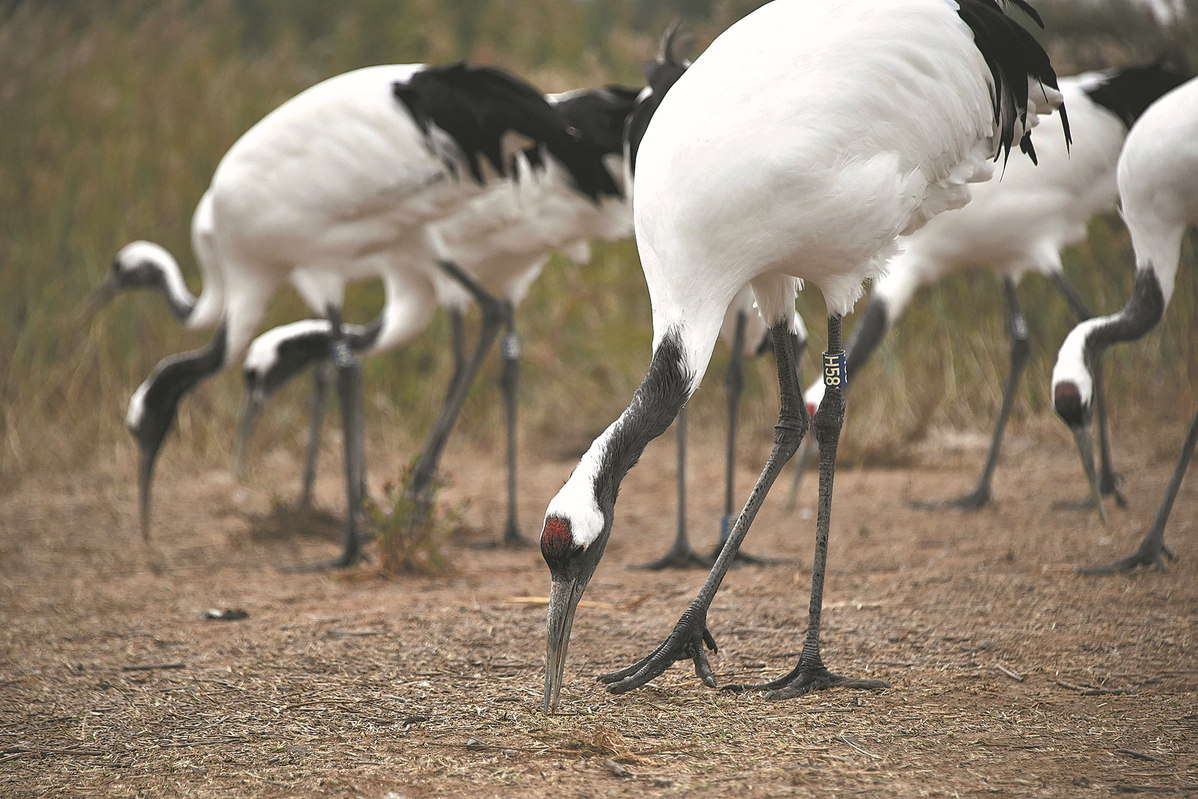本帖最后由 大彻小悟 于 2023-11-2 10:45 编辑

A fisherman checks buoys made from eco-friendly materials that pose no harm to the ocean environment, at an aquaculture farm in Rongcheng city, Shandong province, on Sept 19. LI XINJUN/FOR CHINA DAILYEditor's note: As protection of the planet's flora, fauna and resources becomes increasingly important, China Daily is publishing a series of stories to illustrate the country's commitment to safeguarding the natural world. Shandong province introduces broad range of measures to promote clean development and financially benefit residents Thirty-something Hou from Jinan, Shandong province, opens a mini-program on her mobile phone that tracks, encourages and rewards carbon reduction to see how much she has earned from selling recyclable items over the past two months. The amount is a respectable 255 yuan ($35), according to the mini-program Tanhui Qilu, one of the innovative measures introduced in Shandong as part of its broader efforts to promote environmentally friendly practices among the public, communities and businesses. Hou, who chose not to give her last name, said the app makes it easier to embrace a green lifestyle. "The 'carbon-inclusive' house where I can sell recyclable waste is the part I like the best," she said. "It's a convenient way to deal with waste." She tries to reduce her carbon footprint by walking or using buses for transportation, and selling recyclable items such as cardboard cartons, plastic and clothing via the platform. Over the past five months, she has managed to reduce her carbon dioxide emissions by 572 kilograms, the mini-program tells her. Hou has also collected 252 carbon credits by practicing low-carbon activities and answering questions about carbon emissions. These credits can be exchanged for tickets to scenic spots and to pay for hotel rooms. "The carbon-inclusive platform encourages public participation in energy-saving and carbon emission-reduction actions, promoting sustainable and eco-friendly lifestyles," said Wu Hongyang, director of the climate change response office of Shandong's Department of Ecology and Environment. It also plays a crucial role in leading Shandong toward green, low-carbon, and high-quality development, he added. Since China set the goals of peaking carbon dioxide emissions before 2030 and achieving carbon neutrality by 2060, green and low-carbon concepts and innovations have been applied in people's daily activities and industrial sectors. To date, China has established 572 national-level demonstration areas of ecological civilization construction, according to information released by the Ministry of Ecology and Environment at the China Ecological Civilization Jinan Annual Conference on Saturday. In addition, 240 bases for innovative practices in line with the concept of "lucid waters and lush mountains" being "invaluable assets" have been established, with 32 demonstration areas and 11 bases in Shandong.

Hundreds of solar panels of a photovoltaic plant float on a reservoir in Liaocheng, Shandong province. ZHANG ZHENGXIANG/FOR CHINA DAILYRiver course Shandong has ramped up its efforts on green development in various sectors from grassroots initiatives to provincial-level projects, and established a pilot zone for green, low-carbon and high-quality development, the first of its kind in the country. One major achievement is the restoration of the ecological environment of the Yellow River estuary in Dongying, where the waterway flows into the sea. After three decades, the Yellow River knife fish has been spotted again, thanks to continuous efforts to restore the ecological balance in the area, according to Shandong's ecology and environment department. The knife fish is a rare species that mainly lives in the lower reaches of the river. Due to overfishing and the low water runoff in the river basin, the knife fish population has been declining since the 1990s. Measures to restore the delta's ecological system have been taken in recent years, which are in line with the national strategy of promoting ecological conservation and the high-quality development of the Yellow River Basin. These measures include ecological restoration projects such as supplementary water supplies to ensure the health of wetlands, cordgrass eradication, and offshore biodiversity conservation. A state-of-the-art ecological monitoring facility has also been set up in the delta to manage data on meteorology, water and soil quality, and marine life. Protecting the habitats of key species such as cranes, black-billed gulls, and Oriental white storks, has also been prioritized by authorities, along with preserving native flora such as wild soybeans. Aquatic life is also being increased to boost biodiversity levels. The restored ecological system has benefited residents living near the Yellow River who are eyeing tourism opportunities. In Yangmiao, Kenli district, Dongying, next to the river new residential buildings sit in neat rows. The community provides convenient services, including a seniors' canteen, kindergarten, clinic, and fitness room. In addition, 140 old houses are due to be renovated and upgraded in two phases, in a bid to create a rural tourism destination. The project began trial operations in September, and is expected to create more than 200 jobs, said Zhang Mairong, Party secretary of the community.

Red-crowned cranes roost in the wetlands of the Yellow River estuary in Dongying, Shandong. XU SUHUI/XINHUAHigher goals In the mountainous areas of Shandong, the promotion of ecological conservation has enhanced the development of the agriculture and tourism industries. In Mengyin county, Linyi, known for its hilly, wooded terrain, the promotion of ecological conservation has aided the peach-growing industry, providing livelihoods for more than 100,000 farmers, said the county government. The county has a rich ecological system, with 73 percent of its area covered by forests and a diverse range of plant and animal species. Its natural beauty has attracted tourists, who visit during peach blossom season and contribute to the local economy. In Xizhaojiazhuang village in Lanshan district, Rizhao, what was once a putrid eyesore has been turned into a garden landscape. The village had struggled with sewage issues related to livestock farming and domestic waste. To address the problem, a sewage treatment station was constructed and a network of pipes installed to centrally treat sewage from every household. "The treated water meets standards and can be used to create wetland landscapes and irrigate farmland," said Li Xilin, the Party secretary of the village. With the sewage problem addressed, the village upgraded and renovated the area surrounding the pond, with trees and flowers planted to transform the once dank, polluted area into a garden. In addition, the villagers have established tea gardens so tourists can experience picking leaves. Shandong is committed to the concept of "lucid waters and lush mountains" being "invaluable assets" and prioritizes construction of an ecological civilization, said the province's governor, Zhou Naixiang, at the China Ecological Civilization Jinan Annual Conference. The province is seeking to ensure the achievements of green, low-carbon and high-quality development benefit the well-being of its people, Zhou added.
| 
 |Archiver|mobile|The little black house|Shanghai WTO Net
( 沪ICP备10034107号-3 )
|Archiver|mobile|The little black house|Shanghai WTO Net
( 沪ICP备10034107号-3 )